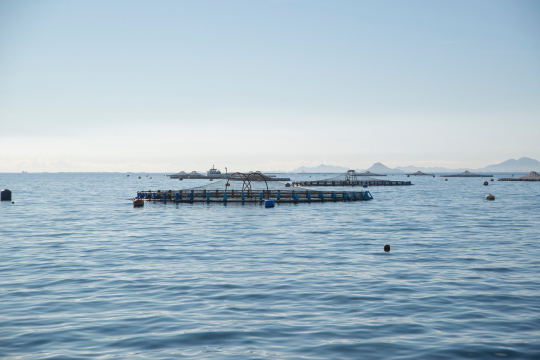Manuel Estay and Leonardo Salazar are research fellows from NENRE EfD-Chile and participated in one of the latest episodes of the TV show Exploradores (Explorers). They addressed the Chilean aquaculture industry and its role worldwide. It has undergone a remarkable transformation in the past decade, driven by increased demand for seafood, technological advancements, and a focus on sustainability.
Manuel explained that a decade ago, the Chilean aquaculture sector was dominated by salmon farming, producing around 400,000 tons annually. Today, the industry has diversified significantly, with a total production of nearly 1 million tons. This diversification has been fueled by the cultivation of mussels, algae, and other marine species, opening up new export opportunities.
Leonardo said, “It is normally known that Chile produces salmon and that it is the ‘star’ product of Chilean aquaculture, but it is not known, for example, that Chile is one of the most important producers and exporters of mussels - Chilean chorito - and one of the most important exporters of algae.”
Opportunities for growth
Leonardo Salazar indicated that Chile has emerged as a leading global producer and exporter of mussels, surpassing China in terms of international trade. The high quality and sustainability of Chilean mussels have made them a popular choice in European markets, particularly in Spain, Italy, and France.
While Chile's algae production is relatively modest compared to Asian countries, it holds a significant position in international trade, ranking second only to Indonesia in algae exports. Chilean algae are primarily destined for the Chinese market, where they are processed for use in food, medicine, and textiles.
Chile's aquaculture industry has gained valuable knowledge and expertise over the years, leading to improved production practices and increased efficiency. This expertise, combined with Chile's favorable natural conditions, positions the country well to continue supplying international markets with high-quality seafood products.
Meeting global demand for protein
As the world's population grows, the demand for protein is expected to increase steadily. Chile's aquaculture industry is well-positioned to meet this demand, providing a sustainable source of marine protein for global consumption.
The Chilean aquaculture industry's growth trajectory is a testament to the country's commitment to innovation, sustainability, and diversifying its export portfolio. As the industry continues to evolve, Chile is expected to play an even more prominent role in the global aquaculture landscape.
Aquaculture is key for NENRE EfD-Chile
Aquaculture is a research field of great importance for the EfD Chile center. It is related to the collaboration of researchers within the center and with other national and international institutions, such as INCAR (Chile) and the SPRFMO, and has a high impact on policymaking. This includes, for example, the participation of a group of researchers from the center in the evaluation of the National Law on Fisheries and Aquaculture, as well as participation in diverse technical committees.
This implies the active participation and contribution of NENRE EfD-Chile researchers in aquaculture topics, actively incentivizing discussions in workshops with researchers and policymakers, as well as raising new research questions that can contribute to a more sustainable industrial activity. Moreover, researchers also collaborate on international projects with other partners in the EfD network, not only analyzing the industrial features of aquaculture but also examining other socioeconomic and environmental impacts.
You can watch the full episode here! (in Spanish) This is the second time that researchers from EfD Chile are featured in Exploradores (Explorers), click here for more information.
By Belén Pulgar and Cristóbal Vásquez
